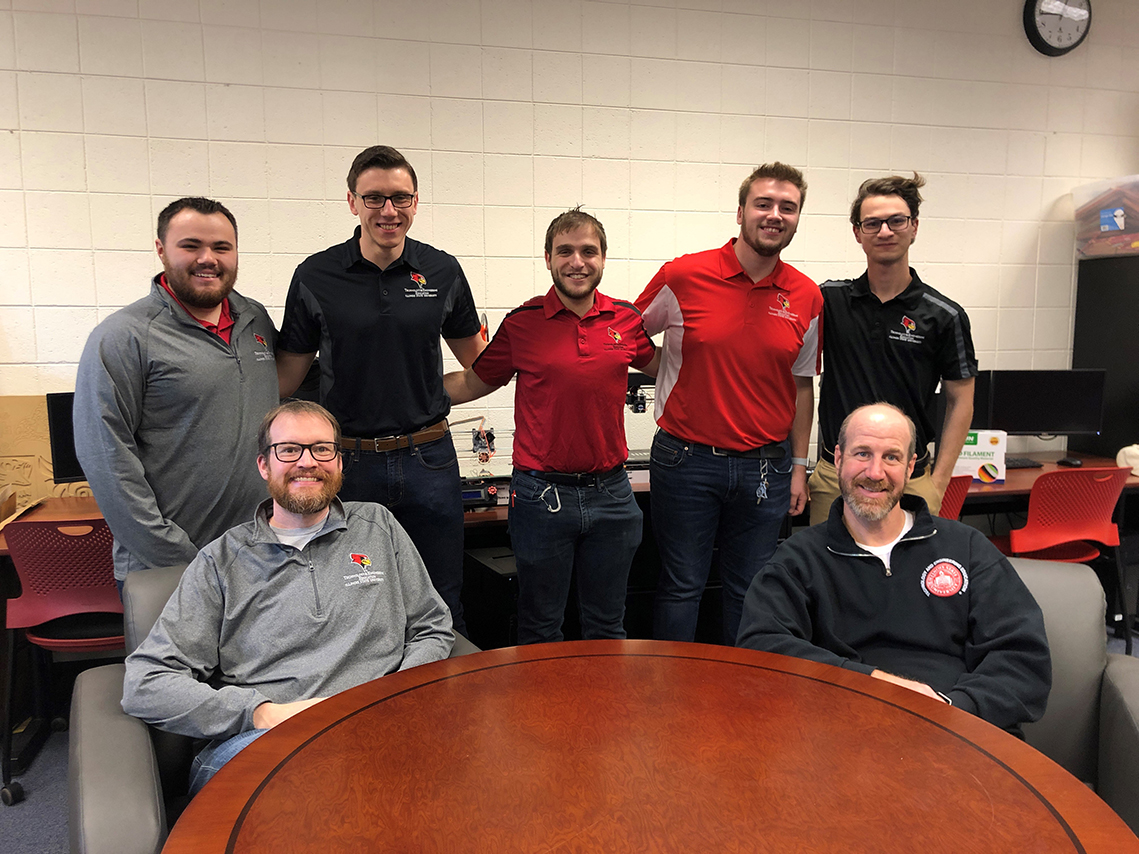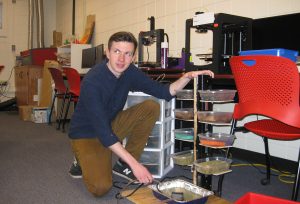The technology and engineering education undergraduate degree program in the Department of Technology currently has six students who are part of or have been part of the National Science Foundation (NSF) Robert Noyce Teacher Scholarship Program at Illinois State University: Jarod Battisto, Joshua Katz, Caleb Scott, Ryan Buckel, Griffin Forberg, and Michael Bailey.
The Noyce Scholarship Program has been helping to prepare teachers for STEM (science, technology, engineering, and mathematics) disciplines since 2002. The program provides funding to higher education institutions to fund scholarships and stipends, and supports junior and senior students in STEM majors and graduate students who are committed to teaching in districts with a large percentage of family incomes below the poverty line or districts with a high teacher turnover rate.
The Noyce goal is to recruit high-achieving individuals with STEM backgrounds to consider a teaching career through Robert Noyce Teacher Scholarship Programs, NSF Teaching, or NSF Master Teaching Fellowships, and capacity-building projects. Through Noyce freshmen and sophomore summer internships, the program affords students invaluable field experiences, which encourage teaching in STEM areas. The STAR Program, Discovery Academy and the courses taken with the Noyce program are beneficial to the student’s development as STEM educators. Teaching a lesson and working with students are great practice for their future classrooms.
“Illinois State Noyce Scholars receive up to $20,000 in scholarship funds, complete a paid internship that emphasizes both teaching and scholarly work in the Scholar’s chosen STEM field, and two tuition-waived courses that prepare Scholars for teaching in diverse settings,” stated Rebekka Darner, Noyce Scholarship Program director and incoming director of the Center for Mathematics, Science and Technology (CeMaST). “Noyce Scholars build strong relationships with each other, their mentors, and the program director, resulting in personalized support throughout college and as they find their first teaching job. Noyce students agree to teach for four years after graduation in a district that has high student poverty or high teacher attrition. Currently, over 55 percent of the districts in Illinois qualify for the teaching commitment. ISU Noyce graduates have all obtained positions within months of graduating and are now working in Illinois high schools throughout the state in Romeoville, Taylorville, Oakwood, Villa Grove, and Harvard.”
“The Noyce Scholars that I have been afforded to work with over the past two years in Technology and Engineering Education have been nothing short of extraordinary. Each Noyce Scholar has completed research projects that have helped to not only move our program forward but has helped to shape research findings in our field. I look forward to working with future Noyce Scholars.”—Chris Merrill, technology and engineering education professor and research mentor
Scott, a junior technology and engineering education major chose to become a Noyce Scholar because of his desire to become a technology education teacher. He wants to teach graphic design and computer aided-design. Scott chose Illinois State because it is near his hometown. He has applied to Noyce Camps in North Dakota and New York for summer 2019 and feels Illinois State has been a great place to prepare him for his teaching career.
“Noyce taught me how to work in a STEM classroom, in a diverse setting, and how to be a mentor to younger students.”—Caleb Scott
In June 2018, Bailey became a Noyce Scholar and mentored four middle school students during Discovery Academy, a STEM education camp for middle school students. Bailey entered into this profession because of his love of engineering and everything it entails. Bailey credits his high school instructors with guiding him to become a technology teacher and feels Illinois State University is one of the best teaching universities within the United States. It is also the only university in Illinois that offers Technology and Engineering Education as a teaching major. Bailey has applied to NASA’s Neil Armstrong Flight Research Center and NASA’s Jet Propulsion Laboratory for a possible summer internship and exploring possible research grants for next year.
“As Noyce Scholars, we are mainly a team of researchers within the realm of technology education who aid in research for the Department of Technology. One of the more important things I’ve learned from my Noyce experience is the strategy of inquiry-based learning. Mostly, it’s a relatively newer style of education that promotes curiosity and student self-learning which ultimately creates a great atmosphere for a STEM classroom.”—Michael Bailey
Noyce scholars work on separate projects, however, they often collaborate for larger projects like research articles. Scott, Battisto, Forberg, and Bailey helped lead Discovery Academy, a STEM camp for middle school students that took place at Bolingbrook High School. It was a tremendous experience which gave them valuable teaching experience within a school setting.
Katz, a senior, is currently student teaching. From fall 2017 to spring 2019, he was a Noyce Scholar. As a teacher’s assistant in high school, Katz enjoyed helping others learn. This experience led him to pursue the degree in Technology and Engineering Education. In the summer of 2018, Katz was accepted to conduct research at the NASA Jet Propulsion Laboratory through the STAR (STEM Teacher and Researcher) Program. During this time, he researched manufacturing processes for the Mars Sample Return Project. The project is a future phase that is in line with Mars 2020. In addition to this, the NASA interns worked on a new methodology of learning which incorporates cognitive and educational psychology with the engineering design process.
“Since teaching in a Technology Education department was my passion, I was looking at different schools around the state. My high school teachers are alumni of Illinois State University. They encouraged me to attend this wonderful university. The professors are known for their hands-on involvement with their pre-service teacher training. From my Noyce experiences, I have learned new information on how to be a better educator. Learning about diversity, inquiry-based learning and limiting gaps in the education system are only a few topics we learned through this scholarship.”—Josh Katz
Forberg, a senior, worked as a teaching assistant for Technology Professor Josh Brown’s TEC 116: Intro to Technical Drawing and Constraint-based Solid Modeling course and worked with him on 3D visualization research. He also worked with Katz and Merrill to develop a user guide for the Boss Laser. Forberg feels the Noyce Scholarship Program has opened doors for him. Through Noyce, he has learned different instructional techniques and developed culturally responsible teaching techniques for learners with different backgrounds and abilities. It also gave him the chance to work and learn in his field of study, technology and engineering education.
The Noyce Scholarship Program at Illinois State University and the technology and engineering education program has given these students tools, resources and experiences that will help them become extraordinary teachers.


